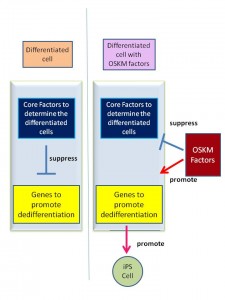Kugako Sugimoto, NOST Tokyo
Originally published on the site of NL Agency
Summary
A research team of the Center for iPS Cell Research and Application of Kyoto University reported in the Proceedings of the National Academy of Sciences (PNAS) of April 1, 2013 that the transcription factors to prevent the dedifferentiation to gain pluripotency of iPS cells were also important for the induction of differentiation processes in the cells. The team used the method of the interference assay for iPS cells to identify core transcriptional factors responsible for differentiation and dedifferentiation. This finding is expected to contribute to understanding the mechanisms of regaining of pluripotency of differentiated cells and the efficient production of high quality of iPS cells.
Details
Transcription factors regulate the gene expression. They have function to promote (1) differentiation, (2) dedifferentiation, and (3) direct conversion of types of differentiated cells. Transcription factors play important roles to make iPS cells from differentiated cells. However, the mechanism of regaining of the pluripotency to become iPS cells is not understood. The research team hypothesized that there should present core transcription factors which determine the specificity of cell types and over-expression of such core transcription factors should prevent the regaining of pluripotency of differentiated cell. At first, the team found out which transcription factors were responsible for dedifferentiation and differentiation among the huge number of transcription factors in a cell.
Identification of core transcription factors for differentiation
To identify the core transcription factors, an interference method of iPS cell induction was used. OSKM factors (Oct3/4, Sox2, Klf4, and c-Myc) to dedifferentiate differentiated cells were introduced to neural-lineage cell lines together with one over-expressed candidate of core transcription factors often found in neural cells. If the over-expressed candidate of
transcription factors introduced to the neural cell lines was a core factor to influence other transcription factors, the pluripotency would not be obtained due to cancelling the effects of OSKM factors. The effects of the candidate of core transcription factors were observed through counting the number of formed iPS cell colonies in comparison with the neural-lineage cells.
Introduction of core transcription factors
After identifying the core transcription factors to prevent dedifferentiation of cells into iPS cells, such identified factors were introduced to other types of differentiated cells of mouse embryonic fibroblasts and liver cells to find out their effect on differentiation. Morphology of mouse embryonic fibroblasts and liver cells that received core transcription factors turned to be similar to those of neural cells. This showed that the core transcription factors to prevent dedifferentiation into iPS cells seemed to be the identical transcription factors to induce differentiation.
Conclusion
The research suggests the transcription factors to prevent initiation of differentiated cells into iPS cells were the identical factors to induce differentiation of cells (Fig. 1). If the function of core transcription factors is removed, the production of iPS cells would become more efficient. Furthermore, since the cancer cells may have specific sets of core transcription factors, such sets can be the target for anti-cancer drugs. Moreover, the identified core transcription factors can be used to produce specific types of cells for clinical use.
Fig. 1 Mechanism of dedifferentiation into iPS cell from differentiated cells involving OSKM
factors, core factors, and genes.
Sources:
1. Transcription factors interfering with dedifferentiation induce cell type-specific transcriptional
profiles, PNAS
2. Newsroom of CiRA, Kyoto University
3. Nikkan Kogyo Shinbun, April 16, 2013.
4. iPS and OSKM factors (Wikipedia)








